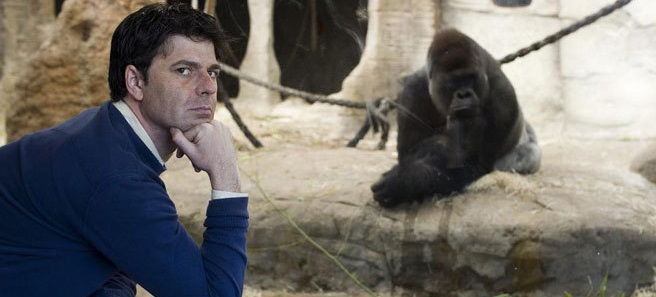'Alpha male chimpanzees deceives in the same way as politicians do'

15/II/14
Pablo Herreros ( Torrelavega, 1976) believes that, to understand the behavior of our species, it is absolutely essential to explore their roots in our closest relatives.
Since late 2012, Herreros writes a blog on the website of the Spanish newspaper El Mundo, called "I, Monkey" in which develops these theories. The success of this innovative informative space has been so spectacular that the Destination publishers had proposed him to develop their ideas in a book with the same title, which has been prefaced by Eduardo Punset, and that will hit the shelves next Tuesday.
Herreros comments that we share 98 % of our DNA with great apes. If the origin of life happened 4.500 million years ago, and we only separate us from other apes about seven million years ago, that means that during 4.493 years, we were the same corps, the same animal.
He thinks that the fact that some readers of his blog who feel insulted by his insistence on the idea that humans are apes, is due to the human desire to want to distinguish ourselves from the rest of the animal kingdom. Another is that primates, precisely because of this proximity with us, causes to some people hilarity or rejection.
Their study reveals that many human behaviors that religions reject, as homosexuality, are natural and part of us since millions of years ago.
Also states that primates combine cooperation and competition to achieve their goals, creating alliances and coalitions to oppose other groups in power. They also lie and manipulate, so that an alpha male chimpanzee who is injured or ill, will hide his weakness against an opponent, so that other males do not realize that their health has been deteriorated.
The specialist tells us, that primates alternate the political styles, the same way that humans do. There are positive and negative leaders. And that negative leaders base their power on the use of intimidation and fear to others in power are lasting less than those who rely on partnerships, the generosity and caring of the group.
"When a leader creates more problems than the ones he solves by his authoritarian style, the rest of the group conducts a coalition to oust him. Normally this coalition is usually made by females, as they are they are more concerned about the balance or stability of the group, as their offspring can be the victims of this aggression. For the most positive leaders, we have realized that what they do is to establish partnerships with other key members of the group and worry about whether welfare even those who have not participated in an episode of hunting. I.e., the leader gives out flesh of the animal hunted with elderly, female or other. These good leaders like Robin Hood, what they do is share, contributing the welfare and stability of the group."
Similarly, gives by demonstrated the concept of justice in the primates. There are primates who reject a reward if they see other ones receive a bigger reward for the same effort they have done. Moreover, in nature have been obtained evidence showing some concept of fairness or justice. When a male or female that are very powerful physically have to play with other group members, the first must control itself, not being too aggressive because in that case, the other partner will not want to play with them.
He expands: "In some animals, we have discovered that the brutes who can not play with finesse and take the game themselves too seriously, are expelled from the group. This means that live less than lives the well integrated ones, that is, the moral and ...justice, that are a very powerful value, are also a mechanism of adaptation to the group, a way to integrate
My self and that my interests do not clash with those of others, and remains beneficial for we all group living."
The author also notes that there is increasing evidence that in both, primates and early hominids solidarity and altruism were the keys to the success of our species. On the one hand, there is a tendency to abuse power and aggressiveness, but at the same time have also discovered that there is a strong impetus to the generosity, help and altruism:
"In some experiments, for example, the opportunity was given to a bonobo (the closest type of chimpanzee to humans) to monopolize some fruit, or open the door to a fellow who they did not know before to share the fruits together. Well, in 100 % of cases, the ape preferred share food than keep it to himself. When we brought these experiments to humans, we have seen that the results are the same. From the beginning, children try to help to a researcher who is in trouble without being asked or without being rewarded. So automatically and instantly have the urge to help those who are suffering or have some difficulty."
To access the full interview (In Spanish):
http://www.elmundo.es/ciencia/2014/02/15/52fe55cdca4741d1028b4581.html
